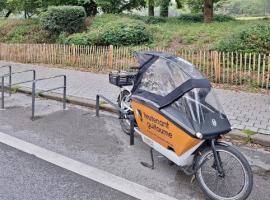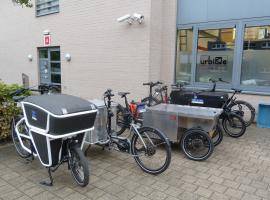One of the starting positions for the project was the understanding that unlike cities such as Amsterdam, Munich, Copenhagen… we couldn’t really talk of a cargo bike culture in Brussels. Although there are a few important companies who have made a serious effort to use cargo bikes and some sustainably motivated, small enterprises who champion this mobility or logistic solution, the lack of a biking tradition is particularly characteristic for the city’s business sector.
This Deli/grocery in the municipality of Forest operates a cargo bike as utility vehicle but also as marketing tool.
The project recognised that in order to mainstream cargo bike use, and structurally transform transportation patterns, business and service providers could represent an important mobilising factor. With this logic in mind the project actively set out to bring the economic sector on board as a key stakeholder in the behaviour change process. This meant widening the “catchment area”, not simply being content with capturing the low-hanging fruit exemplified by the convinced cycling community or young families with small children. However it is also clear that a number of (often linked) factors can, positively or negatively, influence decisions on take-up of cargo bikes, i.e.: weather conditions; daily travel distance; travel time; ease of parking; operational, soft or cost benefits; topography; LGV or car substitution; vehicle and tech reliability; battery range; load capacity; vehicle and maintenance cost. While some of these may motivate take-up, such as operational benefits or avoidance of parking restrictions and charges, others may be perceived by some as favourable, by others as doubtful, some may simply represent an obstacle to purchase or adoption. Cairgo Bike has set out to try and address barriers identified in the Brussels context, for instance by looking to deliver secure parking provision but also to facilitate purchase where considerations of price, maintenance cost, specifications and reliability all come together. It was decided that, within a Brussels mobility pattern dominated by private motorised vehicles, a financial incentive would be necessary to encourage purchase by businesses and professionals in what was largely a first step into the unknown, with few developed business models. Cost price was considered a barrier to purchase, (especially for micro-businesses or start-ups) where ultimately the ambition is to replace motorised vehicle journeys by the cargo bike active/clean travel option.

Long John cargo bike in combination with trailer
While the classic non-electric “bakfiets” has a retail cost of around 1.600€ and still offers a good step in option for families, realistically business initiatives (small scale or large) require dependable, tried and tested e-cargo bikes. It is estimated that in Belgium today, the average price for a reliable, solid performance vehicle is somewhere between 4.500 and 5.000€. The popular Urban Arrow Long John bike retails today at+/- 5.300 , but there are top of the range models on the market for as much as 9 - 10.000€ depending on accessories and technological extras. The ONO state of the art heavy duty model produced by the German (Berlin based) company ONOMOTION cannot be purchased but leased at between 350 to 500€ per month. It has a weather protected driver cabin, radio frequency identification device locks for the vehicle, batteries that can be replaced in seconds at exchange stations and a load carrying capacity of 200kg. So where the ONO is an exceptional case, cost price is not insubstantial, and after buying a basic model, more investment in terms of insurance (theft +/- 125€, comprehensive +/- 150€), GPS facility, protective clothing, additional trailer… must also be taken into account. It is important to calculate what this means in terms of replacement expenditure where cargo bike activity reduces the traditional vehicle pool (the Cairgo Bike objective), or whether it represents an additional cost to exploit operational benefits for certain activities while the vehicle pool is maintained for other tasks.

courtesy of Onomotion












